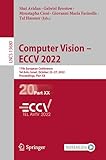Computer Vision - ECCV 2022 [electronic resource] : 17th European Conference, Tel Aviv, Israel, October 23-27, 2022, Proceedings, Part XX / edited by Shai Avidan, Gabriel Brostow, Moustapha Cissé, Giovanni Maria Farinella, Tal Hassner.
Contributor(s): Avidan, Shai [editor.] | Brostow, Gabriel [editor.]
| Brostow, Gabriel [editor.] | Cissé, Moustapha [editor.]
| Cissé, Moustapha [editor.] | Farinella, Giovanni Maria [editor.]
| Farinella, Giovanni Maria [editor.] | Hassner, Tal [editor.]
| Hassner, Tal [editor.] | SpringerLink (Online service)
| SpringerLink (Online service) .
.
Material type:  BookSeries: Lecture Notes in Computer Science: 13680Publisher: Cham : Springer Nature Switzerland : Imprint: Springer, 2022Edition: 1st ed. 2022.Description: LVI, 759 p. 212 illus., 205 illus. in color. online resource.Content type: text Media type: computer Carrier type: online resourceISBN: 9783031200441.Subject(s): Computer vision
BookSeries: Lecture Notes in Computer Science: 13680Publisher: Cham : Springer Nature Switzerland : Imprint: Springer, 2022Edition: 1st ed. 2022.Description: LVI, 759 p. 212 illus., 205 illus. in color. online resource.Content type: text Media type: computer Carrier type: online resourceISBN: 9783031200441.Subject(s): Computer visiontSF: Transformer-Based Semantic Filter for Few-Shot Learning -- Adversarial Feature Augmentation for Cross-Domain Few-Shot Classification -- Constructing Balance from Imbalance for Long-Tailed Image Recognition -- On Multi-Domain Long-Tailed Recognition, Imbalanced Domain Generalization and Beyond -- Few-Shot Video Object Detection -- Worst Case Matters for Few-Shot Recognition -- Exploring Hierarchical Graph Representation for Large-Scale Zero-Shot Image Classification -- Doubly Deformable Aggregation of Covariance Matrices for Few-Shot Segmentation -- Dense Cross-Query-and-Support Attention Weighted Mask Aggregation for Few-Shot Segmentation -- Rethinking Clustering-Based Pseudo Labeling for Unsupervised Meta-Learning -- CLASTER: Clustering with Reinforcement Learning for Zero-Shot Action Recognition -- Few-Shot Class-Incremental Learning for 3D Point Cloud Objects -- Meta-Learning with Less Forgetting on Large-Scale Non-stationary Task Distributions -- DNA: Improving Few-Shot Transfer Learning with Low-Rank Decomposition and Alignment -- Learning Instance and Task-Aware Dynamic Kernels for Few Shot Learning -- Open-World Semantic Segmentation via Contrasting and Clustering Vision-Language Embedding -- Few-Shot Classification with Contrastive Learning -- Time-rEversed diffusioN tEnsor Transformer: A New TENET of Few-Shot Object Detection -- Self-Promoted Supervision for Few-Shot Transformer -- Few-Shot Object Counting and Detection -- Rethinking Few-Shot Object Detection on a Multi-Domain Benchmark -- Cross-Domain Cross-Set Few-Shot Learning via Learning Compact and Aligned Representations -- Mutually Reinforcing Structure with Proposal Contrastive Consistency for Few-Shot Object Detection -- Dual Contrastive Learning with Anatomical Auxiliary Supervision for Few-Shot Medical Image Segmentation -- Improving Few-Shot Learning through Multi-task Representation Learning Theory -- Tree Structure-Aware Few Shot Image Classification via Hierarchical Aggregation -- Inductive and Transductive Few Shot Video Classification via Appearance and Temporal Alignments -- Temporal and Cross-Modal Attention for Audio-Visual Zero-Shot Learning -- HM: Hybrid Masking for Few-Shot Segmentation -- TransVLAD: Focusing on Locally Aggregated Descriptors for Few-Shot Learning -- Kernel Relative-Prototype Spectral Filtering for Few-Shot Learning -- "This Is My Unicorn, Fluffy": Personalizing Frozen Vision-Language Representations -- CLOSE: Curriculum Learning on the Sharing Extent towards Better One-Shot NAS -- Streamable Neural Fields -- Gradient-Based Uncertainty for Monocular Depth Estimation -- Online Continual Learning with Contrastive Vision Transformer -- CPrune: Compiler-Informed Model Pruning for Efficient Target-Aware DNN Execution -- EAutoDet: Efficient Architecture Search for Object Detection -- A Max-Flow Based Approach for Neural Architecture Search -- OccamNets: Mitigating Dataset Bias by Favoring Simpler Hypotheses -- ERA: Enhanced Rational Activations -- Convolutional Embedding Makes Hierarchical Vision Transformer Stronger.
The 39-volume set, comprising the LNCS books 13661 until 13699, constitutes the refereed proceedings of the 17th European Conference on Computer Vision, ECCV 2022, held in Tel Aviv, Israel, during October 23-27, 2022. The 1645 papers presented in these proceedings were carefully reviewed and selected from a total of 5804 submissions. The papers deal with topics such as computer vision; machine learning; deep neural networks; reinforcement learning; object recognition; image classification; image processing; object detection; semantic segmentation; human pose estimation; 3d reconstruction; stereo vision; computational photography; neural networks; image coding; image reconstruction; object recognition; motion estimation.


There are no comments for this item.